Xiaoxiang Shi
Nexus: Taming Throughput-Latency Tradeoff in LLM Serving via Efficient GPU Sharing
Jul 09, 2025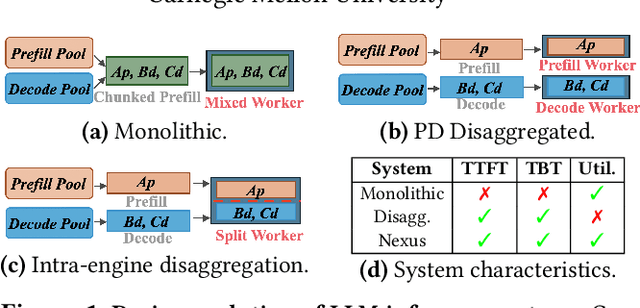
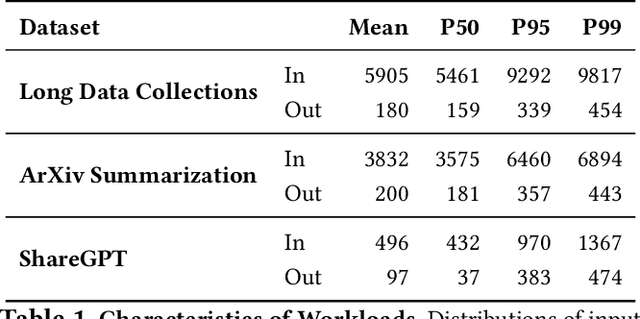
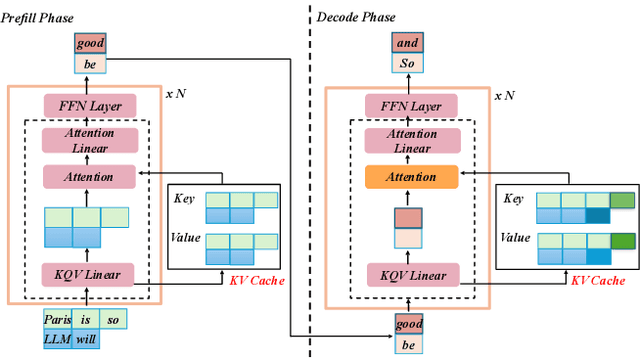
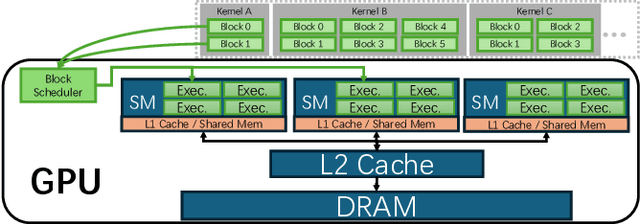
Abstract:Current prefill-decode (PD) disaggregation is typically deployed at the level of entire serving engines, assigning separate GPUs to handle prefill and decode phases. While effective at reducing latency, this approach demands more hardware. To improve GPU utilization, Chunked Prefill mixes prefill and decode requests within the same batch, but introduces phase interference between prefill and decode. While existing PD disaggregation solutions separate the phases across GPUs, we ask: can the same decoupling be achieved within a single serving engine? The key challenge lies in managing the conflicting resource requirements of prefill and decode when they share the same hardware. In this paper, we first show that chunked prefill requests cause interference with decode requests due to their distinct requirements for GPU resources. Second, we find that GPU resources exhibit diminishing returns. Beyond a saturation point, increasing GPU allocation yields negligible latency improvements. This insight enables us to split a single GPU's resources and dynamically allocate them to prefill and decode on the fly, effectively disaggregating the two phases within the same GPU. Across a range of models and workloads, our system Nexus achieves up to 2.2x higher throughput, 20x lower TTFT, and 2.5x lower TBT than vLLM. It also outperforms SGLang with up to 2x higher throughput, 2x lower TTFT, and 1.7x lower TBT, and achieves 1.4x higher throughput than vLLM-disaggregation using only half the number of GPUs.
TeleRAG: Efficient Retrieval-Augmented Generation Inference with Lookahead Retrieval
Feb 28, 2025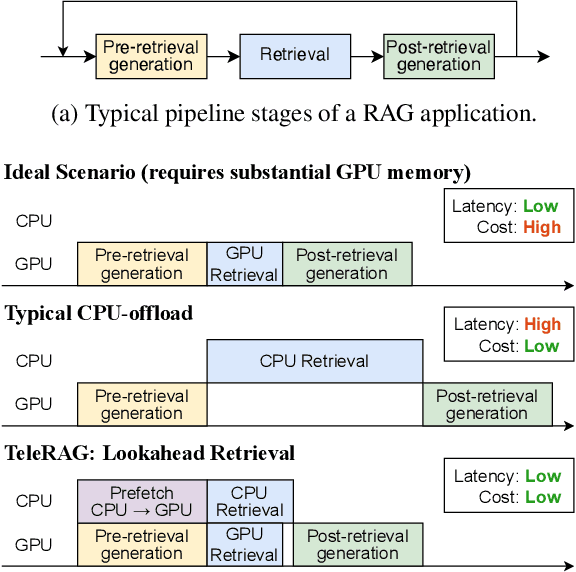



Abstract:Retrieval-augmented generation (RAG) extends large language models (LLMs) with external data sources to enhance factual correctness and domain coverage. Modern RAG pipelines rely on large datastores, leading to system challenges in latency-sensitive deployments, especially when limited GPU memory is available. To address these challenges, we propose TeleRAG, an efficient inference system that reduces RAG latency with minimal GPU memory requirements. The core innovation of TeleRAG is lookahead retrieval, a prefetching mechanism that anticipates required data and transfers it from CPU to GPU in parallel with LLM generation. By leveraging the modularity of RAG pipelines, the inverted file index (IVF) search algorithm and similarities between queries, TeleRAG optimally overlaps data movement and computation. Experimental results show that TeleRAG reduces end-to-end RAG inference latency by up to 1.72x on average compared to state-of-the-art systems, enabling faster, more memory-efficient deployments of advanced RAG applications.
Autellix: An Efficient Serving Engine for LLM Agents as General Programs
Feb 19, 2025Abstract:Large language model (LLM) applications are evolving beyond simple chatbots into dynamic, general-purpose agentic programs, which scale LLM calls and output tokens to help AI agents reason, explore, and solve complex tasks. However, existing LLM serving systems ignore dependencies between programs and calls, missing significant opportunities for optimization. Our analysis reveals that programs submitted to LLM serving engines experience long cumulative wait times, primarily due to head-of-line blocking at both the individual LLM request and the program. To address this, we introduce Autellix, an LLM serving system that treats programs as first-class citizens to minimize their end-to-end latencies. Autellix intercepts LLM calls submitted by programs, enriching schedulers with program-level context. We propose two scheduling algorithms-for single-threaded and distributed programs-that preempt and prioritize LLM calls based on their programs' previously completed calls. Our evaluation demonstrates that across diverse LLMs and agentic workloads, Autellix improves throughput of programs by 4-15x at the same latency compared to state-of-the-art systems, such as vLLM.
SuperScaler: Supporting Flexible DNN Parallelization via a Unified Abstraction
Jan 21, 2023



Abstract:With the growing model size, deep neural networks (DNN) are increasingly trained over massive GPU accelerators, which demands a proper parallelization plan that transforms a DNN model into fine-grained tasks and then schedules them to GPUs for execution. Due to the large search space, the contemporary parallelization plan generators often rely on empirical rules that couple transformation and scheduling, and fall short in exploring more flexible schedules that yield better memory usage and compute efficiency. This tension can be exacerbated by the emerging models with increasing complexity in their structure and model size. SuperScaler is a system that facilitates the design and generation of highly flexible parallelization plans. It formulates the plan design and generation into three sequential phases explicitly: model transformation, space-time scheduling, and data dependency preserving. Such a principled approach decouples multiple seemingly intertwined factors and enables the composition of highly flexible parallelization plans. As a result, SuperScaler can not only generate empirical parallelization plans, but also construct new plans that achieve up to 3.5X speedup compared to state-of-the-art solutions like DeepSpeed, Megatron and Alpa, for emerging DNN models like Swin-Transformer and AlphaFold2, as well as well-optimized models like GPT-3.
 Add to Chrome
Add to Chrome Add to Firefox
Add to Firefox Add to Edge
Add to Edge